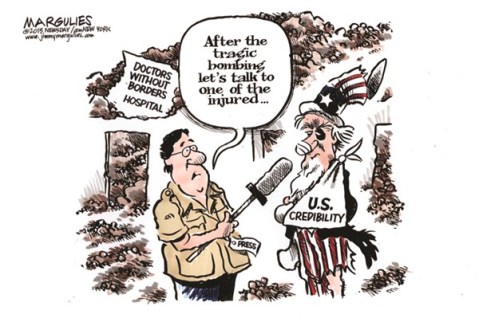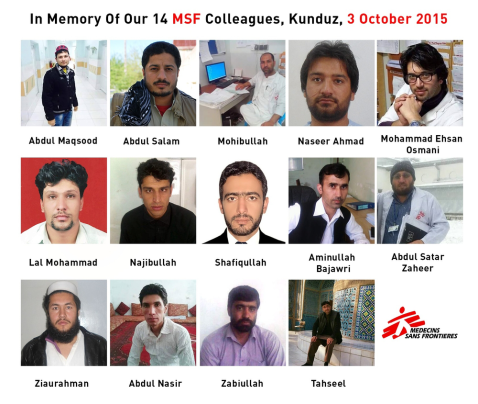MSF continues to press for real answers on Kunduz hospital bombing

Despite the U.S. military’s cover story for its latest war crime in Afghanistan – the Oct. 3 bombing of a Doctors Without Borders (MSF) hospital in Kunduz – being rather firmly in place, MSF is not giving up its quest for accountability, nor ceasing its calls for clarification on whether the United States still recognizes the rules of war as they apply to protections of medical facilities.
In a press release issued Monday, MSF reported on its latest action to bring attention to this case, a rally held last week across the street from the White House. The group delivered thousands of pages of printouts listing the names of more than half a million people who signed the MSF petition demanding an independent inquiry.
As MSF explains,
We did this to honor the staff members and patients who died that night and to continue our ongoing effort to get answers to lingering questions about how such a horrific incident could take place – how a well identified, fully-functioning hospital could be targeted with precise and overwhelming fire power for more than an hour. As it happened, just days after our gathering in Washington, DC, we shared the sad news that our own investigations of the incident and its aftermath had revealed that the death toll from the attacks now stands at 42 people, including 14 MSF staff members.

In continuing its calls for an independent investigation, MSF is rejecting the U.S. version of events that led to the heinous and dastardly attack on the hospital. As the top U.S. general in Afghanistan, Gen. John Campbell, told reporters last month, the military’s internal inquiry into the assault had determined that it was “a tragic but avoidable accident caused primarily by human error.”
The investigation’s results, which were announced the day before Thanksgiving ensuring that they would receive the least possible amount of attention, determined that the airstrike on the trauma center “was a direct result of human error compounded by systems and signals failure.” Campbell said the crew aboard the AC-130 gunship “believed they were striking a different building several hundred meters away where there were reports of insurgents.”
The military’s improbable version of events – at least the fifth story that the U.S. has issued in justification of its actions – included something like a “perfect storm” of human and technical errors that led to the multiple airstrikes conducted against the hospital for an hour despite numerous phone calls and messages from MSF to U.S. military contacts imploring them to call off the bombing. (Those messages were apparently not relayed to the aircraft’s crew, which was limited by technical malfunctions, according to Campbell.)
“We failed to meet our own high expectations,” Campbell said. “Those who called and conducted the strike did not take procedures to verify this was a legitimate target.”
Of course, most people would expect that the U.S. military has at least a vague idea of what targets it is bombing on any given day, so Campbell’s characterization of these standards as “high” might ring hollow to some. Indeed, Doctors Without Borders objected to this account, noting that the new U.S. cover story raises more questions than answers, and that the lax U.S. standards regarding its bombing procedures are “shocking.”
Responding to the U.S. military investigation’s findings, Christopher Stokes, MSF’s general director, said, “The U.S. version of events presented today leaves MSF with more questions than answers. It is shocking that an attack can be carried out when U.S. forces have neither eyes on a target nor access to a no-strike list, and have malfunctioning communications systems.”
“The frightening catalog of errors outlined today illustrates gross negligence on the part of U.S. forces and violations of the rules of war,” Stokes added.
Of course, this assumes that the strike was actually done in error, which is a rather dubious and naive assumption indeed. As a list provided by The Intercept’s Jon Schwarz a few days after the Kunduz attack makes clear, the United States has a long and bloody track record of intentionally bombing civilian targets. A few of the more scandalous examples of U.S. attacks on civilian targets include the following (more details here):
Infant Formula Production Plant, Abu Ghraib, Iraq (January 21, 1991)
On the seventh day of Operation Desert Storm, aimed at evicting Iraq military forces from Kuwait, the U.S.-led coalition bombed the Infant Formula Production Plant in the Abu Ghraib suburb of Baghdad….
Air Raid Shelter, Amiriyah, Iraq (February 13, 1991)
The U.S. purposefully targeted an air raid shelter near the Baghdad airport with two 2,000-pound laser-guided bombs, which punched through 10 feet of concrete and killed at least 408 Iraqi civilians. …
Al Shifa pharmaceutical factory, Khartoum, Sudan (August 20, 1998)
After al Qaeda attacks on U.S. embassies in Kenya and Tanzania in 1998, the Clinton administration targeted the Al Shifa factory with 13 cruise missiles, killing one person and wounding 11. …
Train bombing, Grdelica, Serbia (April 12, 1999)
During the U.S.-led bombing of Serbia during the Kosovo war, an F-15E fighter jet fired two remotely-guided missiles that hit a train crossing a bridge near Grdelica, killing at least 14 civilians. …
Radio Television Serbia, Belgrade, Serbia (April 23, 1999)
Sixteen employees of Serbia’s state broadcasting system were killed during the Kosovo War when NATO intentionally targeted its headquarters in Belgrade. …
Chinese Embassy, Belgrade, Serbia (May 7, 1999)
Also during the Kosovo war, the U.S. bombed the Chinese embassy in Serbia’s capital, killing three staff and wounding more than 20. …
Red Cross complex, Kabul, Afghanistan (October 16 and October 26, 2001)
At the beginning of the U.S-led invasion of Afghanistan, the U.S. attacked the complex housing the International Committee of the Red Cross in Kabul. …
Al Jazeera office, Kabul, Afghanistan (November 13, 2001)
Several weeks after the Red Cross attacks, the U.S. bombed the Kabul bureau of Al Jazeera, destroying it and damaging the nearby office of the BBC. Al Jazeera’s managing director said the channel had repeatedly informed the U.S. military of its office’s location.
Al Jazeera office, Baghdad, Iraq (April 8, 2003)
Soon after the start of the U.S.-led invasion of Iraq, the U.S. bombed the Baghdad office of Al Jazeera, killing reporter Tarek Ayoub and injuring another journalist. …
Palestine Hotel, Baghdad, Iraq (April 8, 2003)
The same day as the 2003 bombing of the Al Jazeera office in Baghdad, a U.S. tank fired a shell at the 15th floor of the Palestine Hotel, where most foreign journalists were then staying. Two reporters were killed …
When it comes to the attack on the Kunduz trauma center, the U.S. was well aware of the hospital’s location and indeed had been provided the precise coordinates just days before the assault. MSF has noted that “confirmation of receipt was received from both U.S. Department of Defense and U.S. army representatives, both of whom assured us that the coordinates had been passed on to the appropriate parties.”
MSF has also revealed that the United States government had inquired just two days before the strike whether there were any Taliban “holed up” in the facility, to which MSF replied that “the hospital was full of patients including wounded Taliban combatants.” According to MSF, there were approximately 20 Taliban patients in the hospital and three or four wounded government combatants.
This would seem to provide an obvious motive for the U.S. air strike – the elimination of the Taliban patients inside the hospital and the prevention of any future care being administered to U.S. enemies in Afghanistan.
Indeed, MSF has raised the possibility that the attack was intentional and has directly asked the U.S. government whether it still respects the Geneva Conventions’ protections of medical personnel. This, obviously, is highly relevant for MSF, which relies on these protections to perform its duties in conflict zones.
As MSF President Joanne Lieu wrote in the introduction to a report on the incident issued last month, “The attack on our hospital in Kunduz destroyed our ability to treat patients at a time when we were needed the most. We need a clear commitment that the act of providing medical care will never make us a target. We need to know whether the rules of war still apply.”
The MSF report also provided substantial circumstantial evidence that the U.S. strike was indeed a premeditated war crime, noting that the bombing consisted of “a series of multiple, precise and sustained airstrikes [that] targeted the main hospital building, leaving the rest of the buildings in the MSF compound comparatively untouched.”
MSF pointed out that the specific target hit in what appeared to be surgical strikes “correlates exactly with the GPS coordinates provided” to the United States, indicating that the U.S. may have used the coordinates to more precisely target the hospital.
Considering the obvious motive and the damning circumstantial evidence – not to mention the fact that the U.S. explanations for its actions have changed five times – you might think that the media would treat this attack as a possible war crime rather than a mistake or an accident. However, you would be dead wrong.
Despite the overwhelming preponderance of evidence pointing to an intentional and premeditated war crime, national media outlets such as the Associated Press routinely insert the words “accidental” and “mistaken” into their reporting, including their headlines, which have significant influence in shaping public perceptions.
“Death Toll in Accidental U.S. Airstrike on Kunduz Hospital Even Higher Than Thought,” read a Dec. 12 AP headline, while another, on Nov. 25 read “’Human Error’ Cited in Mistaken US Airstrike on Kunduz Hospital.”
At best, these preposterous and misleading headlines would be considered shoddy journalism, since there is no way of knowing – other than accepting at face value the self-serving proclamations of U.S. officials – that this airstrike was indeed an accident. At worst, it could be considered aiding and abetting the cover-up of a serious crime, making the AP and other media outlets accessories after the fact.
At the very least, U.S. media should withhold their judgments on whether it was an accident until an independent investigation has run its course – but of course, so far, the United States has systemically blocked that investigation from taking place.
To join Doctors Without Borders in calling for President Obama to stop blocking an impartial inquiry into this tragic incident, click here.
